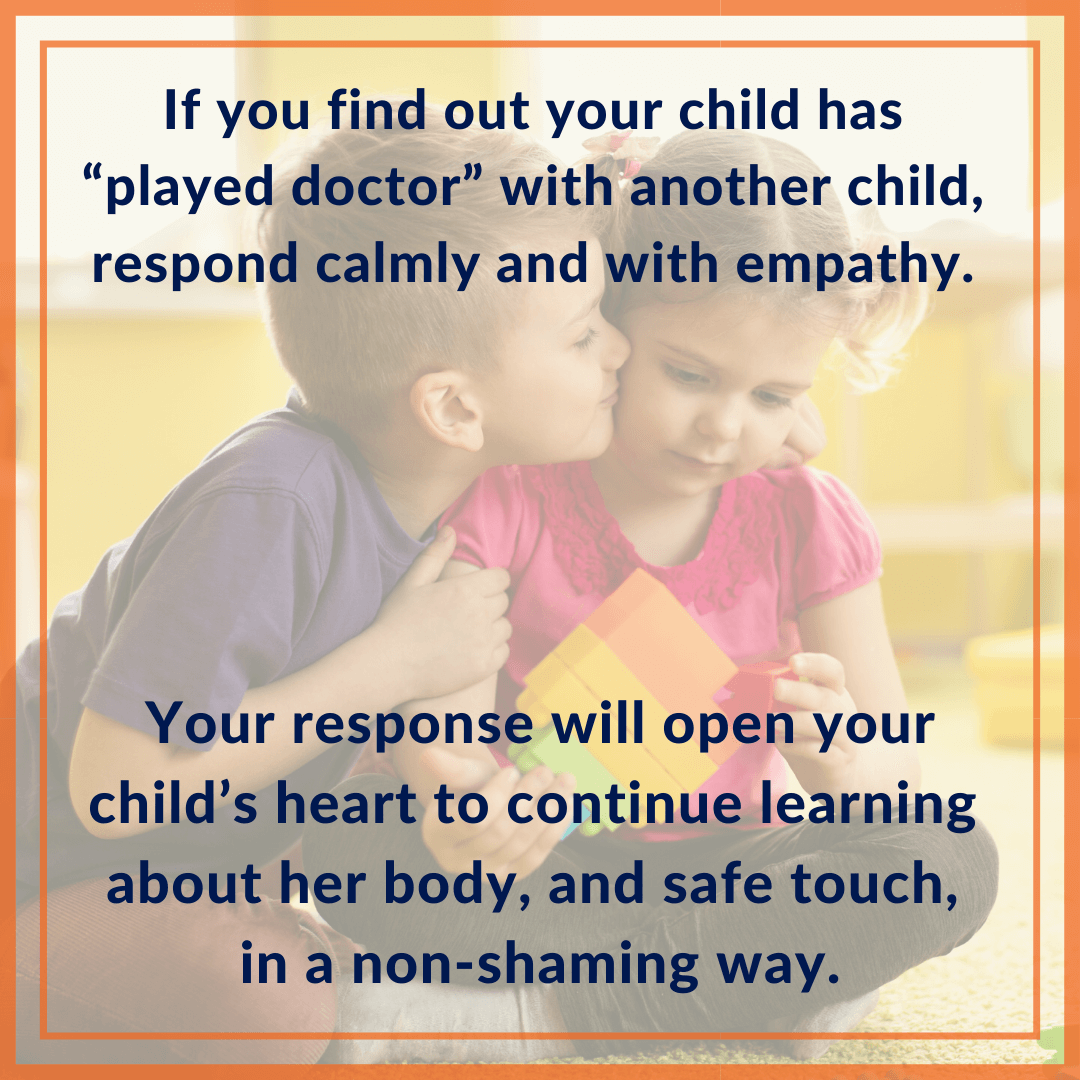
Your child is “playing doctor” with a friend

The Connected Families Framework is an effective tool for parents to utilize in a variety of challenging scenarios, including teaching children healthy boundaries. It provides four powerful messages to kids; even in hard situations as we desire to pass along God’s grace and truth. The following two scenarios were questions posed to our parent coaches regarding young children and the private parts of their bodies. Both answered with different nuances, but based on the Connected Families Framework.
A difficult question posed to Chad Hayenga:
How should I respond to my 4-year-old daughter who was in a closet, naked, with our 6-year-old neighbor boy?
Last night, while at my neighbor’s house, my 4-year-old daughter was in a closet with our neighbors’ 6-year-old son. They were naked and the neighbor boy asked my daughter if she wanted to make a baby. (We have never talked about making babies before or even how that is done.) My daughter said no. We asked her if he showed her anything and she said, “Yes.”
Later that night, she was touching herself, which is something I do not usually see and I asked her what she was doing. She said she was touching herself, I then asked if anyone else has ever touched her like that. She said no, but that the neighbor boy wanted to touch her there but she told him “No”.
I’m not quite sure how to sort this through with our daughter or our neighbor.
Our questions for you are:
- How concerned should we be?
- How do we further protect our daughter? We talked about keeping her clothes on and not letting anyone touch her body.
- What kind of conversations do we need to have with our neighbors? (We want to be proactive but not too intrusive. Our kids play sports together, so we see them regularly.)
- Is there anything else that I need to consider?
Thanks for your insight,
A concerned and confused parent
Chad’s response:
One of the most difficult aspects of a situation like this is managing our own fear and anxiety about what happened. Ask yourself: What is true about this scenario? What is true about your daughter? How does God see this situation? I would encourage you to focus on the opportunity to help your daughter grow and overcome. (Child, you are SAFE with me.)
From my vantage point, it seems you have done a really beautiful job of engaging with your daughter. You were conscious of not over-reacting and not placing shame or blame. You asked matter-of-fact and direct questions. Based on her matter-of-fact answers, it doesn’t appear that she felt judged or condemned. (Child, you are LOVED no matter what.)
She described a scenario and I would likely believe what she is saying. She resisted his requests. She did a lot of things well! Does she still talk about it? Reference it? Remember it? I don’t think going back to the situation repeatedly is particularly helpful, unless she wants to. Role-play is a good way to teach. If there are other siblings who can be taught the same things that would be helpful. This is about everyone respecting the boundaries of others. (Child, you are CAPABLE.)
As you ponder who is RESPONSIBLE here, consider that everyone plays a part.
How did your neighbors handle it beyond just asking for details? Did they take it seriously? Did they talk to their son about good boundaries and healthy touch in a non-shaming/blaming way? Do they feel shameful about it and try to sweep it under the rug? It might be prudent, in the name of caution, to not allow your daughter to be alone with the boy unless you are present.
YOU are responsible for teaching your children healthy boundaries. You are also responsible, as her parent, to empower her to communicate concerns, or any possible future inappropriate incidents.
These are tedious conversations and teaching children healthy boundaries often feels much more uncomfortable for the parent than the child. Work to normalize the conversation. Maybe mix this topic in with other conversations about getting older/more mature (i.e. additional responsibilities around the house, good table manners).
Praying for your family. May God grant you wisdom and peace.
Read on to hear Lynne Jackson’s response to a dad with a similar question, but about a repeated event:
We have a 4 1/2 year-old son, and two daughters who are 7 and 2. Our neighborhood has tons of girls. I try to get good Daddy/Son time, but I know he feels left out when the girls all start playing together. We have had concerns that he needs more boy time. Our kids have been playing with the girls next door whose parents are good friends of ours.
Not long ago, we found my son and their youngest daughter (3 years old) kissing and the daughter starting to show her bottom to our son. We all communicated the seriousness of this to the kids.
Then, last month, some new neighbors moved in. They have a 4-year-old daughter and a couple of weeks after they moved in I caught my son and their daughter on the trampoline showing their private parts to each other. I want him to know how serious this is and have told him we should never do that. Since it has happened twice, I don’t know if I’m getting through to him. (When I was younger my mom caught me with a neighbor. I clearly remember the big spanking to communicate how bad it was.)
I’d love any suggestions you can offer.
Thanks.
Lynne’s response:
Great and important question! It’s pretty normal for kids this age to be curious and to explore their emerging discovery about their (and others’) bodies. When it happens, after being addressed, it may still be normal but require more stern correction. Or it could be evidence that perhaps they’ve observed or even experienced the very behavior they are displaying. Either way, we’ve found it helpful to think through the lens of the Connected Families Framework as you respond:
You are SAFE with me
It is warranted, when kids continue in their inappropriate behavior, to consider that there may be more to this than just kids being curious. Though it may indeed be just a normal exploration, it is also normal at a time like this to feel pretty concerned, even anxious. If this is the case, it’s best if you can protect your child from that anxiety so that your child continues to feel safe with you. Your calmness will be an important part of navigating this with your son and your neighbors, as well as your best asset for making good decisions.
You are LOVED no matter what
Communicating love is best done at first through empathy. A statement like, “You seem really interested in your body.” might be the gateway into a matter-of-fact conversation about how God made us and why those parts of our bodies are meant to be kept private. You might even tell your son that you understand his curiosity, because you struggled with this as a child. It’s important to communicate “love no matter what” because if your response leaves your son feeling ashamed, it could compel him to keep secrets about what’s happened. Our experience is that secrets about this sort of thing can actually increase the tendencies.
You are CALLED and CAPABLE (of learning to make wise choices)
The fact that he volunteered more information (i.e. the kissing) than you already had about the incident is really good, and worth affirming. He trusts you! He was honest! This is good. Remind him that talking about these things honestly is a special way that dads and sons connect and learn together. You could also affirm that his curiosity about how bodies work is a natural thing at his age. (One book we would recommend in this area is God Made All of Me.)
The “capable” message is where you can help him understand what he needs to know (but doesn’t yet) in order to make wise choices. You can then talk with him about what healthy touch looks like: God has designed special private parts of the body for only mommies and daddies to touch and share with each other. It can hurt people’s hearts when that happens before they are married.
Some examples to help him understand this might be:
- Use the analogy of opening a Christmas present too soon and then everyone is disappointed that there’s no wonderful surprise on Christmas.
- Ask him, “What would be the best way to care for your heart and body, and your friends’ heart and body?”
- Develop a plan/rule to help him such as: “Always keep clothes on when I’m with other kids. That keeps us all safe.” A great rule to start early. 😉
The “you are capable” message also includes mentoring kids’ wisdom by sharing your own journey. You can continue with the story about when you were “caught with a neighbor” and describe how you learned why it could be hurtful and that you decided you didn’t want to do it again. You might even share about the spanking you received.
You are RESPONSIBLE for your actions
Try asking him if he promises to not do that again.
- If he says “No” (which is unlikely) you can thank him for his honesty. And then let him know he will need to take a break from these friends for a little while, so the parents can protect both of them and keep their private parts safe.
- If he says, “Yes”, affirm that, but let him know if he has trouble following through with his good intentions, you will absolutely still love him just as much. But he will need to take a break from these friends until they can act in a safe and respectful way.
It’s our experience that when parents can navigate teaching children healthy boundaries through the lens of the Connected Families Framework, kids (and parents!) usually get through this “exploration” phase of childhood. Continue to encourage him that you believe he will be caring and careful as he plays respectfully with others. And then pray for him as you close your conversation and bless his growing ability to honor others and make wise choices.
If, however, after your best efforts to proactively address this issue, there continues to be exploration/private touch with playmates, it could be that your son is exhibiting evidence of previous experiences that you don’t know about. If this is the case, we would advise that you seek professional guidance from a trusted child psychologist.
In conclusion
The scenarios above can be really tricky and we don’t offer a prescriptive way to go about handling them. Using the Connected Families Framework as a guide for teaching children healthy boundaries allows for a way into, and through, the conversation that keeps communication lines open while building trust in our most important relationships.
Sign up below to receive a weekly dose of encouragement straight to your inbox:







